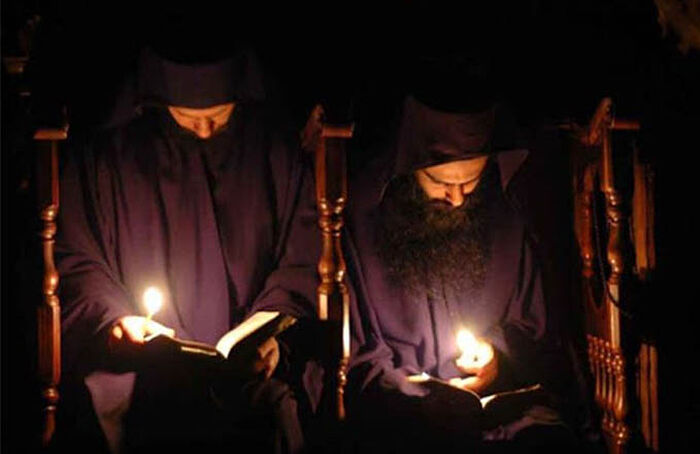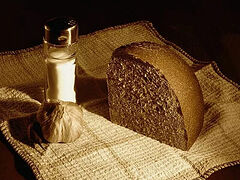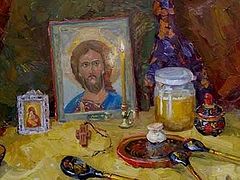If greed cast us out of paradise, then its antidote, fasting, returns us to it.
“Adam was banished from paradise for disobedience and rejected from its delight, beguiled by the words of a woman, and sat naked near that place, lamenting and crying out, ‘Woe is me!’ Let us also take care to raise ourselves to the time of fasting, submitting to the Gospel traditions, that by them we might become pleasing to Christ and again reach the habitations of paradise.”1
Fasting is the destruction of death, which appeared as the consequence of sin. A person who fasts is freed (for now in part, of course) from the laws of the fallen world. He tears apart the infernal circle of the dialectic of lust and satisfaction, hunger and satiety, turning his desires toward the contemplation of paradisal reality. As childhood is an image of angelic life, the restoration of innocence, and the passionlessness of Adam, so also does fasting open to man paradisal life and a foretaste of eternal life, where the chosen will be seen as true angels in the flesh; for the power of their desire will be wholly directed from the flesh to the spirit.
Orthodox fasting is deeply penetrated with this eschatological atmosphere. It of course remains a means for acquiring virtues, but it is already deified. It could be said that it is a goal in itself. For example, the rules that forbid eating meat during Great Lent are of course aimed at weakening the flesh; however, by observing them the believer assimilates a new mode of existence: He restores in himself, here and now, the state of Adam who did not eat meat before his fall into sin, and gains a foretaste of the manner of the coming life—where, according to St. Theodore the Studite, the chosen will no longer be in submission to the needs of the flesh.
Fasting is the restoration of nature
Fasting is “violence exerted over nature”, but a violence necessary in order for reason to regain its sovereignty over the belly and unreasoning part of the soul. While food generates passions, fasting is the “mother of the virtues” and all good deeds. It is the “royal path of purification”, the guardian of purity, and “mother of passionlessness”. It is like a sword that cuts all evil away from the heart; it humbles the passions like the lions that Daniel tamed thanks to his temperance. Casting away the demons, it helps us flee the fire of Gehenna, grants us the angels’ intercessions, and enlivens our souls deadened by passions.
“Fasting is the mother of purity, the condemnation of sin, the preaching of repentance, the life of the angels, and the salvation of men.”
During the Forty Days, fasting submits the flesh to the activity of the soul: “The servant girl no longer gives orders to the queen but has finally returned to her proper place.” This restoration of harmony in the human system has social and even cosmic results, which the holy fathers knew how to cultivate. Fasting, they affirm, brings balance into the family—thanks to it the young and old each remain in their own place and cultivate their own virtues. Thanks to it the nation is preserved in good order, and the city is in peace. Thanks to the restrained relationship of a person—a true microcosm—to the entire tangible world, the center of which is man, the air itself becomes as if purer during Great Lent. And the universe also naturally aids in man’s purification.
Fasting and repentance
Fasting of course remains the main and even irreplaceable support of repentance. Without fasting—that is, without the body’s participation in the soul’s effort to convert and return to its original state, which it applies during the course of forty days—repentance (metanoia) would remain in vain. “Fasting,” says St. Basil the Great, “is the beginning of repentance.” Incidentally, in the hymnological catechism of the Triodion, troparia exclusively praising fasting are rare; more often they are associated with metanoia or with the totality of the virtues that are cultivated during the Lenten period.
“Be sober, be vigilant, sigh, weep with fasting; cast off the burden of sin O my soul, so that you might through fervent repentance be delivered from the fire, and by weeping over your sins you might rend the garment of mourning, receiving a divine garment.”
Fasting and synergy (co-laboring with God)
Even more clearly than the other virtues we have discussed thus far, fasting fits into synergetic activity: the mortification and subjugation of the flesh depend only on us, but this voluntary self-sacrifice provides us with a spiritual compensation incomparably surpassing the ascetic efforts we exert.
“If we have sinned, lets us fast because we have sinned. If we have not sinned, let us fast so that we might not sin. Let us give away what we have—fasting—and receive what we do not have—passionlessness.”
Orthodox ascesis knows no mortification of the flesh simply for the sake of mortification. Because fasting opens contemplation to us, that should be its only aim.
Fasting and contemplation
The general principle of Orthodox spirituality in relation to both virginity and fasting is such that the oppression of the flesh must definitely be proportionate to contemplation. If fasting is united with the right faith and observed as befits a Christian (and not as the Pharisees practice it), it will unfailingly lead the mind to the heights of contemplation. As St. John Climacus says,
“Fasting is purity of prayer, enlightenment of the soul, guarding of the mind, softening of stony-heartedness, the door of compunction …, the beginning of hesychasm …, the conduit to passionlessness, the forgiveness of sins, the door and delight of paradise.”
The refined body of a faster allows him to step with ease toward heaven and even soar to deification on the “wings of divine virtues”.
“Come my soul, arrayed in the virtues of fasting, and arise on wings from this jealous evil to the heights; and delight in the contemplation of the radiant ones who through faith made themselves the very image of the divine.”




